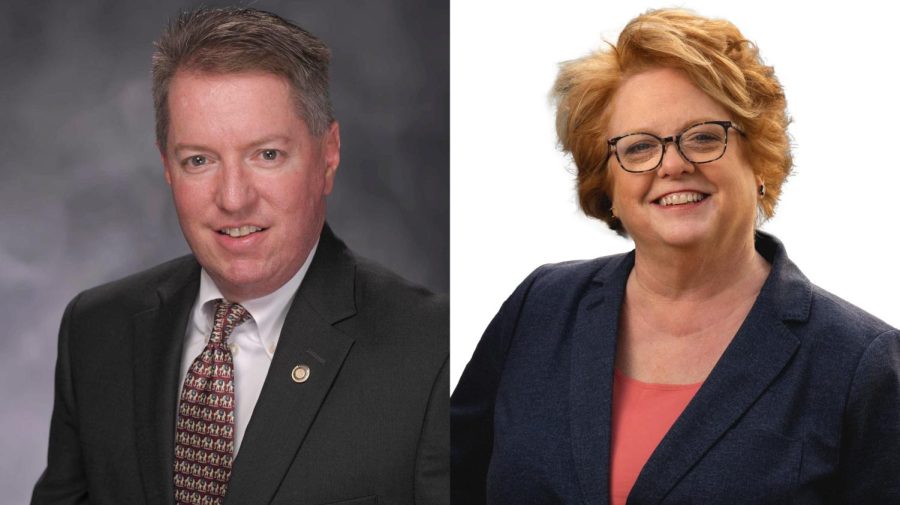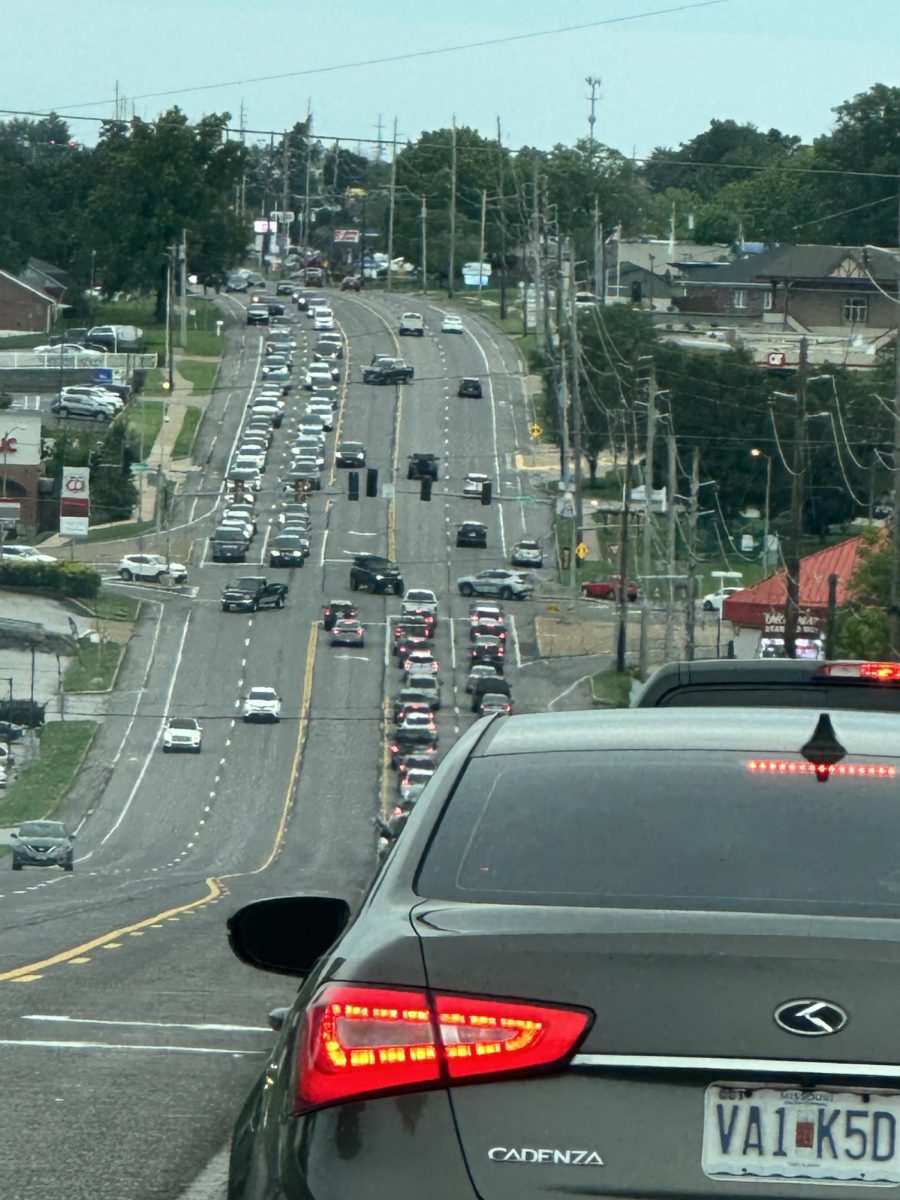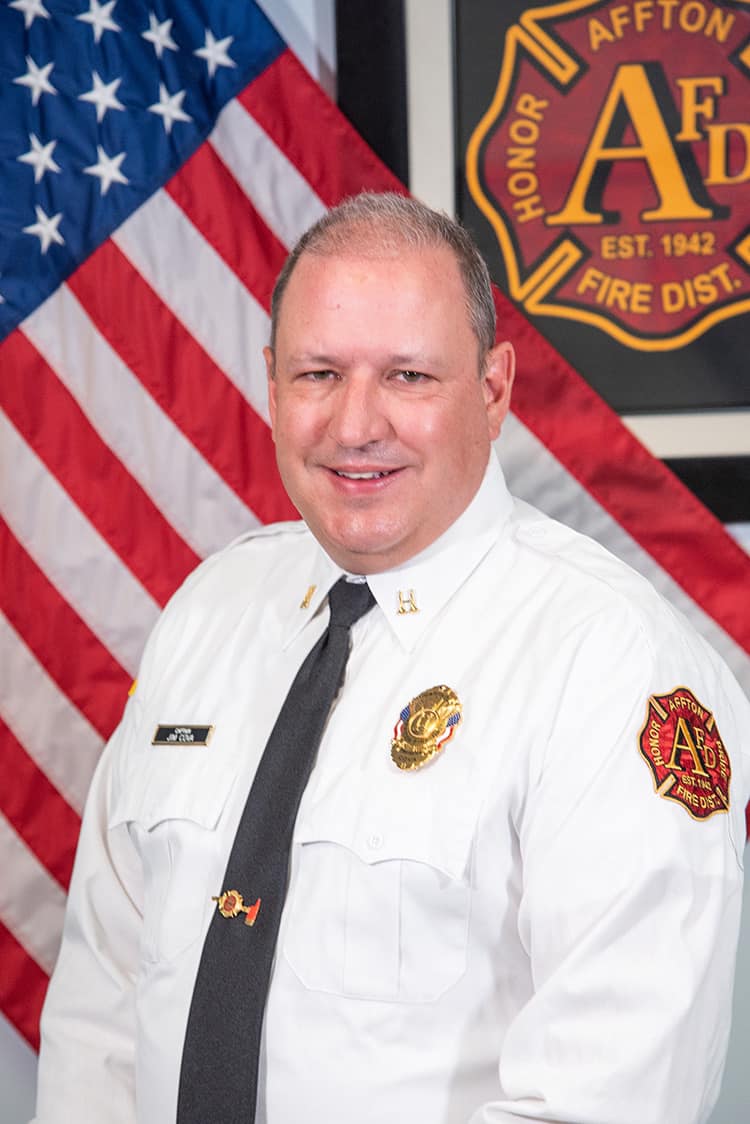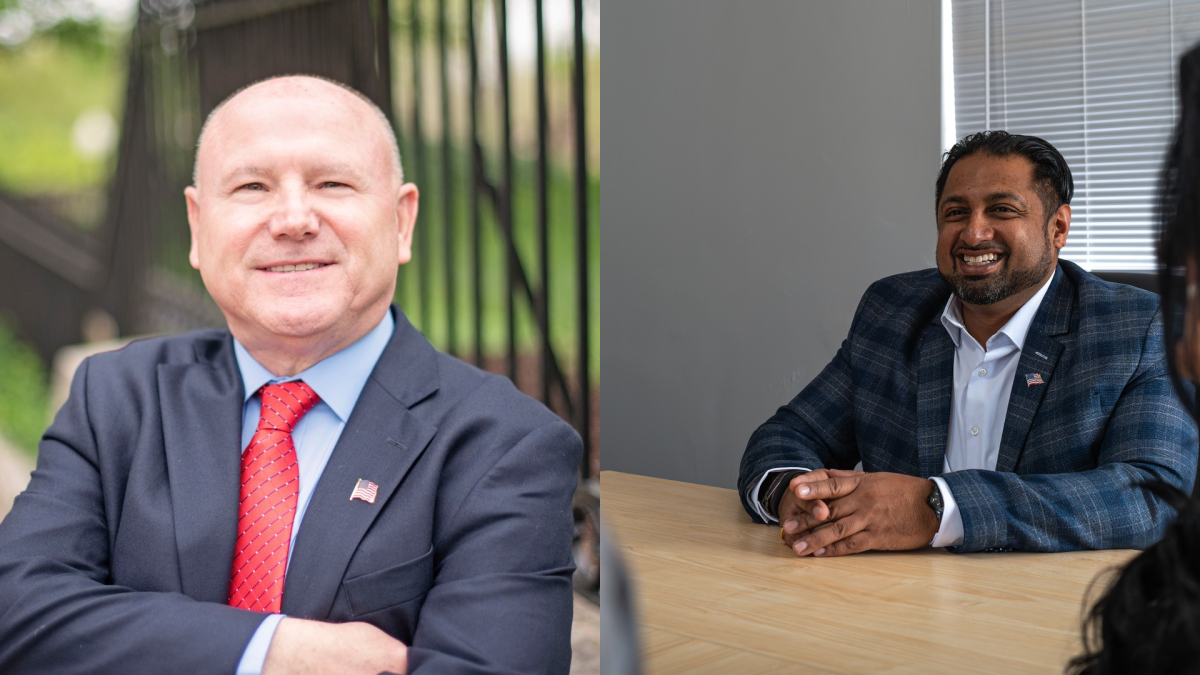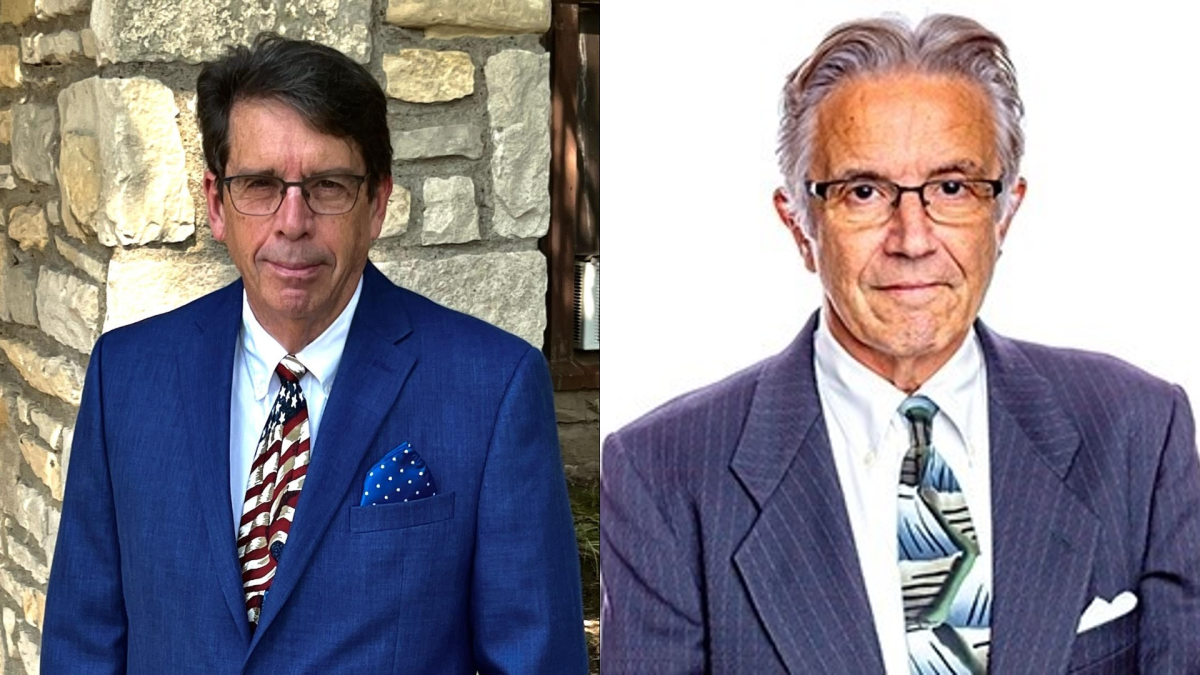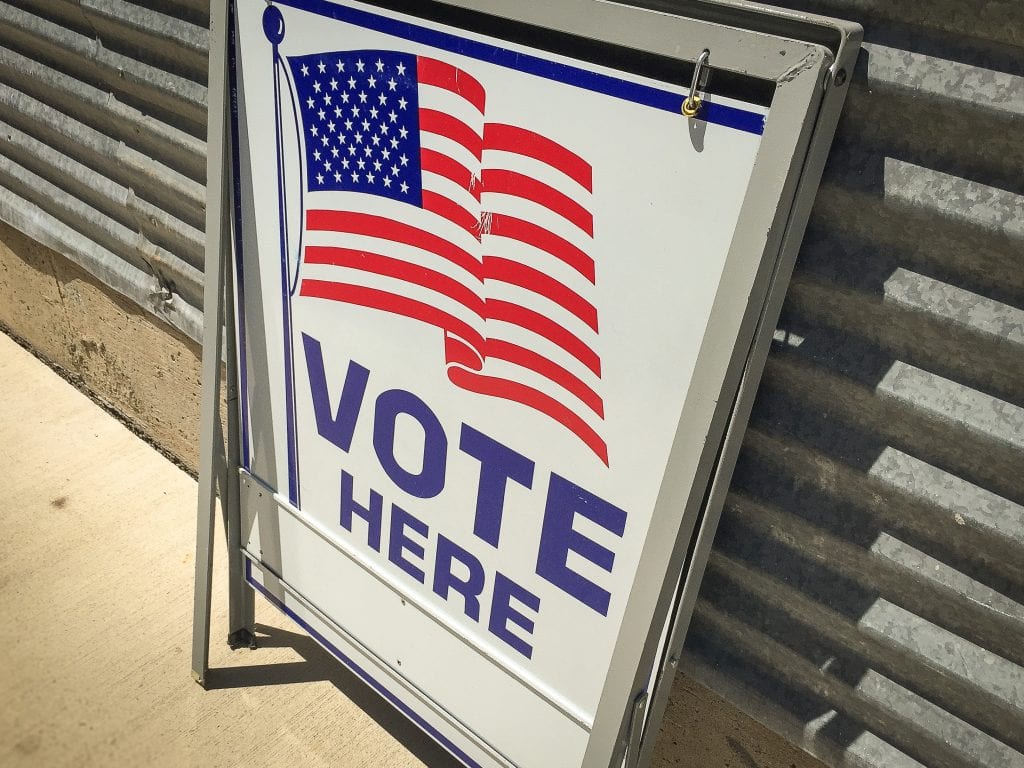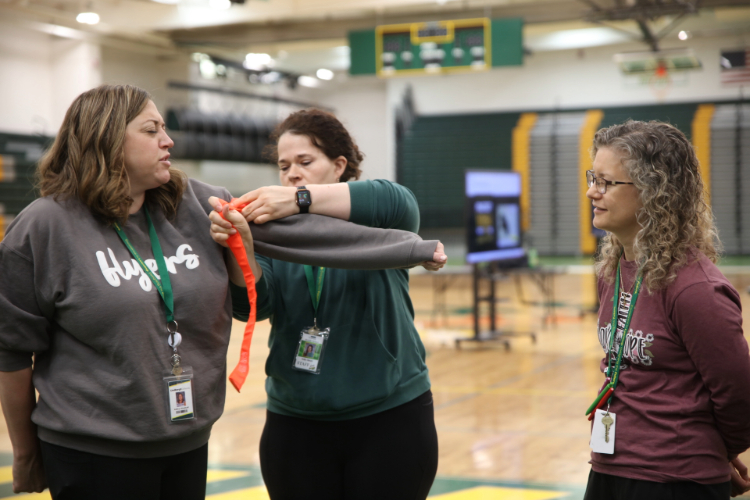Incumbent Rep. Michael O’Donnell, R-Oakville, is being challenged for the 95th District Missouri House seat representing Oakville by Ann Zimpfer, a newcomer to public office. The election is Tuesday, Nov. 8.
O’Donnell, 54, is a municipal finance professional and a U.S. Navy Reserve officer. He was first elected in 2018.
When asked why he is seeking reelection, O’Donnell said, Having spent more than 30-years engaged in the finances of cities, towns, school districts and states, I’ve seen states, like Illinois, drive themselves to the brink of insolvency with unchecked spending. I understand the need to make the difficult spending decisions for Missouri that avoid that sort of outcome. I’m a fiscal and constitutional conservative who would like to continue his service to the community; first via my continued service in the Navy and now by serving the South County community in Jefferson City.”
Zimpfer, 60, is a retired Mehlville School District teacher. She previously ran for the 95th seat in 2020.
When asked why she is seeking office, Zimpfer said, “As a retired teacher and mother of an adult son with an intellectual disability, I can be an advocate for students, teachers, and families that face various challenges. I also believe that the 95th House District has not received adequate representation in Jefferson City for some time, and I do not believe the current representative effectively represents the values of South County. Missourians also deserve better from their representative in the constituent service aspect of this job.”
The candidates gave the following responses to The Call’s candidate questionnaire:
(Editor’s note: The following questions and answers appeared in the Oct. 6, Oct. 13 and Oct. 20 print editions of The Call. They have been edited to fit in print.)
What issue do you consider the single most important issue in this race and why?
O’Donnell: “Economic development is crucial to our stability. South County residents expect the legislature to deal with the things that have the largest impact on their lives … Having been selected a business champion by the Missouri Chamber of Commerce, I know how important it is that companies continue to provide good paying jobs and more companies come to the state.”
Zimpfer: “In 2022, I believe one of the most important issues in this election is preserving democracy … Democracy hangs in the balance this November, and it will always be the most important in every election going forward because without democracy we will lose the right to have elections in any meaningful capacity. As a woman, I know that my right to vote comes on the shoulders of women who worked to give the right to vote to women just a bit more than 100 years ago, and it is by no means a guaranteed right.”
What do you believe are the core responsibilities for someone elected to this office?
O’Donnell: “The core responsibility of a representative is to be the voice of the constituents they represent. They need to make sure that the policies they support and oppose reflect the values and the needs of the district.”
Zimpfer: “First, you must be able to represent all constituents, not just the people who elected you … Second, you must serve those constituents … Third, they have a responsibility to communicate with their constituents about everything happening in the General Assembly during a legislative session beyond a random mail update.”
What is your position on abortion?
O’Donnell: “I am pro-life and will always be a voice for the voiceless unborn child.”
Zimpfer: “I am a pro-choice candidate, but it should still be regulated to ensure the safety of women and girls undergoing the medical procedure … That incredibly personal decision does not belong to politicians.”
What is your position on the death penalty?
O’Donnell: “I support the death penalty for the most extreme cases.”
Zimpfer: “I do not support the death penalty. There are heinous people that have done heinous things, but I have severe discomfort allowing the state to execute people because people have been executed before and found innocent later.”
What do you propose to generate revenue for road and bridge improvements?
O’Donnell: “I would like to see more federal, state and local partnerships to help fund road and bridge improvements in our area. During my first-term, our use of short-term bonding allowed us to secure a federal grant and saved us millions of dollars and is providing important construction jobs.”
Zimpfer: “The gas tax approved with a bipartisan vote last spring is a first step to generating revenue for these infrastructure improvements … I think re-examining that gas tax increase a few years down the line to see if it needs to be increased again would help us keep up with states that invest more in their infrastructure.”
What will you do to improve Missouri’s economy?
O’Donnell: “Improving the state’s economy … is going to require new businesses to relocate here or be started here. A large component of that growth will require a workforce that is trained for the jobs of tomorrow … I have passed legislation to strengthen and modernize our power grid which is crucial to businesses.”
Zimpfer: “The legislature left billions in state and federal funds on the table during the session … We must make sure that this money is invested in our state. Republicans push for lower corporate taxes that will cost our state billions of dollars just in the hope of attracting businesses … Equally important is maintaining and creating infrastructure … and attracting skilled workers.”
How will you advocate for the needs of your district in the legislature?
O’Donnell: “For me, being an advocate for my community means going to Jefferson City to fix problems that impact South County residents and Missourians. Whether it’s the bills I passed to reduce crime, promote economic growth in our region or strengthen our utility infrastructure, I will continue to work to make my lifelong home a better place.”
Zimpfer: “To advocate for the folks in the 95th, a representative must listen to the constituents in the district to understand specifically what those needs are. That means speaking with voters, but it also means building a strong connection with our business community, public school officials and other leaders in our community. As a candidate, I have done this by knocking on the doors of voters and asking them what is important to them and what their concerns are for our area. Additionally, I would like to institute a monthly town hall schedule to keep folks up to date on what is going on in the Capitol.”
What is your position on tax-increment financing? Are changes needed to this law?
O’Donnell: “I believe in free markets and would like to see the use of tax increment financing reduced. Local and state governments are responsible for making sure that the infrastructure is in place for successful business development in our community and that continued support requires businesses to support their local communities through the taxes they pay.”
Zimpfer: “I believe TIFs might be well-intentioned, but they have too much room for abuse … It’s difficult to determine what new changes would remedy this since it’s essentially a roundabout way for the state to invest in economic development projects … Every investment comes with risk, so it might just be inherent to the idea of TIFs … And some of these developments do succeed, so it’s difficult to say we should do away with TIFs entirely. If changes are needed, developers need to assure the state that construction jobs are competitively bid and efforts are put in place to not push out residents who are living at a lower income to only bring in housing that is cost prohibitive.”
Would you support placing a constitutional amendment before voters that, if approved, would repeal the supermajority requirement for school-district bond issues?
O’Donnell: “No because raising taxes should never be easy. Also, with current market conditions, this would do very little to help our public schools. School districts with strong credit ratings, like Mehlville and Lindbergh, would only get a two to five basis point interest rate break, if any at all, for the supermajority vote. As the law stands today, it has not prevented our local school districts from continuing to borrow money at very low-interest rates. Investors scoop up Lindbergh and Mehlville bonds quickly and the districts have suffered no serious consequences for not having the general obligation backing that a supermajority vote would have given.”
Zimpfer: “Yes, I would support such an amendment. Communities need the freedom to be flexible since local districts are responsible for a relatively large proportion of their funding. It makes no sense to me to give 35 percent of the population veto power over the other 65 percent.”
Are changes needed to the state’s current Open Meetings and Records Law?
O’Donnell: “I support any effort to make government business and the spending of taxpayer money a more open and transparent process … However, they’re not entitled to know the opinions and personal business, including medical information, of other Missourians in their correspondence with their elected officials.”
Zimpfer: “No, but we do need to prevent some changes that have been proposed from making it onto the law. They would limit transparency by limiting the scope of what records are public.”
Should police departments be defunded?
O’Donnell: “Defunding and disarming our police will erode the safety of our families. I am humbled to receive the endorsements of the St. Louis and Missouri Fraternal Orders of Police and the Missouri State Council of Fire Fighters. Having deployed to Iraq and Afghanistan, I understand the dangers and fears our police officers face and the stress it causes their families … I will support those brave men and women with the tools, resources and funding they need to keep South County safe.”
Zimpfer: “No, but we should look at policing in a more holistic sense that allows local governments to meet the unique needs of the wide variety of situations the police respond to. As it stands now, we trust police officers to respond to and solve general criminal activity, mental health crises, health problems … horrifying crime scenes, and more. We’re asking so much of our police officers, when really we should be including trained mental health professionals who can alleviate some of this strain and provide a response to mental health issues.”
What changes should Missouri make to its health-care system?
O’Donnell: “We need to continue to work to bring down … costs. We are paying more and more every year but we’re getting less and less. The inflation rates we’re seeing today have been going on in the health care system for a very long time and that is simply not sustainable.
Zimpfer: “Our health care system is failing the people of Missouri. Health care should be affordable and accessible. By providing quality preventative care many healthcare costs would be reduced.”
(Editor’s note: The following questions and answers are web exclusive and have been lightly edited for clarity and appropriateness.)
Other issues you perceive in your race and your position on each:
O’Donnell: “Crime continues to be a problem in our region. So much so that it has become a deterrent to companies relocating to our area for increased job opportunities. Now, more than ever, we have to give our police the resources they need to deal with this problem. We cannot expect to keep our families safe and grow our economy by defunding and disarming our police. As voters, we need to hold our elected prosecutors accountable when they’re soft on criminals.
“Technology is changing rapidly, and we need to take a really hard look at how our K-12 and post-secondary education curriculum is preparing students and future workers for the opportunities that are going to exist. We also need to empower parents to have the final say in what their children are being taught in their schools. Government waste and out-of-control spending is a huge issue right now. We need to cut the fat, shrink the bureaucracy, and prioritize how we are using state resources. We need to ensure that no taxpayer money is being used to provide services to illegal immigrants.”
Zimpfer: “Education: As a retired educator, I am uniquely qualified to understand the public school system and I also value our state’s responsibility to provide every student in Missouri with a free public education to enable equal opportunity for all. I can also see clearly that our state legislature does not currently value students enough. Among states, Missouri currently ranks last in starting teacher pay, 47th in average teacher salary, and 46th in average expenditure per student. A big reason for that is that we rank dead last in state share of funding vs. education, which leaves local sources to pick up the slack, and a lot of local communities cannot meet that burden. We cannot leave Missouri at the bottom, nationally, in per pupil expenditures and beginning teacher pay. We must also address early childhood education as the base of educational growth and look at plans for universal pre-K. Strong schools build strong communities.
“Healthcare and abortion access: With the recent Dobbs decision, we must focus on improving reproductive healthcare access in Missouri. It is unconscionable to me that survivors of rape and incest are now forced to carry their rapist’s or their abuser’s child to term with absolutely no recourse. It’s even more unconscionable to me that my opponent would vote for a policy that barbaric and claim that he will use the force of government to take away the right for a woman to make the most personal choice she can make for herself and her family. And because of his vote, hospital legal departments and politicians now have more say over whether or not a woman’s pregnancy is life-threatening than the doctor in charge of her health. Missouri already has one of the highest maternal mortality rates in the nation, and every reputable source says our abortion ban will only mean more expectant mothers die in this state when those deaths can be prevented. Additionally, we must protect Medicaid expansion, which was supported by over 60 percent of voters in the 95th District. We must also do more to address and support mental healthcare in this region and state, by making it more accessible and affordable and properly funding the Department of Mental Health.”
What do you perceive to be the 95th District’s greatest challenges? How will you address these challenges?
O’Donnell: “Right now, people in our community are feeling the economic pressures of record high inflation and an impending recession. As a state we need to do whatever we can to reduce that pressure. That means returning unneeded tax dollars to taxpayers’ stressed wallets, like we did in September, or creating a business environment that facilitates more job opportunities. My entire time in the Missouri House has been spent supporting economic development and infrastructure development as well as trusting Missouri taxpayers to do what’s best with their hard-earned dollars and I plan to
continue to that, should the voters decide to send me back to Jefferson City to fight for them.”
Zimpfer: “The 95th faces a lot of challenges, but, when I am talking to voters at the doors, they are concerned about how divided our country, state, and even community have become. Our community is unique in the respect that we are considered a “bedroom community” without a base of large businesses or industry. With this in mind, we must facilitate an environment where small businesses can thrive and grow to create an economic heart around which a community can coalesce. Without those shared, common interests, we’ll only see the division that plagues our area grow.”
What do you perceive to be the state’s greatest challenges over the next decade?
O’Donnell: “The state is finally beginning to attract new businesses but so many of those successes never happen because Missouri – and the St. Louis area in particular – has gotten a reputation for being a dangerous, crime-ridden place. If we do not address this, Missouri’s economic success will stall and eventually collapse. There is no single, quick fix solution to this problem. It is going to take a multipronged effort. For example, the legislation I passed to help the City of St. Louis get rid of its almost 25,000 vacant properties will have a huge impact in ending the use of vacant homes as hubs for crime. Also, going soft on criminals is clearly not working and I believe we need to reverse course but also do more to reduce recidivism and help criminals who have paid their debt, to become productive members of society and thereby further reducing crime.”
Zimpfer: “The chronic underfunding of some of our state’s most essential services. No one likes paying taxes, including myself!. But we pay taxes to pay for services that help our most vulnerable citizens and provide access to resources we all share. Critical services like public schools, well-maintained roads and bridges, mental health services, the foster care system and the children’s division, and so many others are begging for more money to adequately pay their employees so we can continue to have these services. And with ongoing and newly introduced tax cuts, we will only exacerbate our funding problems over the next decade.”
Are changes needed to the state’s foundation formula for funding education?
O’Donnell: “Definitely. South County residents have been sending more money out of the Mehlville and Lindbergh school districts than they are paying into them. More of that money needs to stay here to increase the educational opportunities right here in South County. During my first term we saw a proposal that would have taken millions of dollars from the Mehlville and Lindbergh school districts. If re-elected, I will continue to fight such measures.”
Zimpfer: “Absolutely. The Mehlville School District (among others) has felt the brunt of the foundation formula for years because of the “Local Tax Effort” figure in the formula, which leads to greater per-student funding shortfalls in districts with lower property values. Clayton and Ladue have smaller shortfalls, while poorer suburban, urban AND rural districts all have to bear a larger cost that they often can’t afford. This causes a lot of disparity in our public education system, leaving far too many students without the resources they deserve to receive a quality education. At the very least, I would amend the foundation formula to put a cap on the amount allowed on the per-student shortfall so that beyond a certain point, state funding would kick back in to ensure that those with local tax bases are not left behind (at least not as much). Beyond that, we should adequately fund the foundation formula, which is something the legislature has struggled with in the past.”
Are changes needed to the law allowing Missouri citizens to carry concealed weapons? If so, why? If not, why not?
O’Donnell: “I remember all of the scare tactics that were used when the voters passed the conceal and carry law here in Missouri and none of that has come to pass. Conceal and carry is about allowing law-abiding citizens to safely protect themselves.”
Zimpfer: “I believe concealed carry owners should be required to take a gun safety course as part of their application process, but I do not believe we need significant changes in our concealed carry law, which respects our Second Amendment rights while balancing safety. I believe our issue is that permitless carry is allowed. We’ve seen gun violence skyrocket in the years since we passed a law in 2007 that allowed Missourians to buy guns without a permit.”
Are changes needed to the state’s eminent domain laws to prevent abuse?
O’Donnell: “Eminent domain abuse is a real problem and we need to quickly put an end to this practice. Last session, we made some real strides to empower private property owners in eminent domain proceedings. Private property is private property and the government has no right to infringe on the private property rights of law-abiding citizens.”
Zimpfer: “Eminent domain laws had specific guidelines that gave the government power to take your land only if that land was for public use which traditionally meant it was to be used for roads and bridges. That definition has been expanded and authorized eminent domain for blight clearance. I do believe changes should be made to prevent abuse of the law, but I would need specifics about how these changes would be worded and carried out.”
Would you support legislation to facilitate a merger of St. Louis County and St. Louis city?
O’Donnell: “Absolutely not. I co-sponsored the measure that ultimately stopped the Better Together effort during my first term and will continue to fight a merger if re-elected. I have met so many South County residents who are so upset by the thought that their tax dollars could wind up going to help bail out the financially strapped city. I will continue to do everything I can in the legislature to protect South County residents from this attempted land and money grab by the city.”
Zimpfer: “In Jefferson City, absolutely not. That decision should belong to residents in St. Louis City and St. Louis County alone. Generally, I would not support the merger as it was outlined in 2019, and I also believe it’s difficult for me to comment for all of St. Louis County since I live in a region of the county that’s unincorporated. Decisions are made for our area in Clayton by our County Council, but other incorporated areas elect people to make decisions for their municipalities. I’m not comfortable taking that right to self-governance away from them, and if that was a condition of a city-county merger, I’d be against it.”
What process do you favor for redistricting? What do you think of the state’s current redistricting process?
O’Donnell did not answer.
Zimpfer: “I do not believe lawmakers should have the say over what their districts look like or to pick and choose their constituents. It’s a clear conflict of interest, and we saw that this year as senators and representatives abused the process to get favorable districts for future political efforts. Not only that, it has also led to an increase in gerrymandering and a lack of competitive districts, which dissuades people from participating in democracy and local government because they feel their vote doesn’t matter. I would prefer an impartial demographer who focuses on keeping communities as connected as possible, while also not privileging incumbency (and I don’t just say that because I’m running against an incumbent!).”
Do you support the changes the Legislature made to the Sunshine Law in 2019, including exempting some legislative records?
O’Donnell: “I did support that change. A citizen should feel comfortable sharing whatever information they think is necessary when communicating to their elected officials. A private citizen should not have to forfeit their right to privacy just to get help from their legislator. I will continue to fight to protect the privacy of the citizens of the 95th District.”
Zimpfer: “Even though House Bill 445 (2019) failed to enter into law (and with it Rep. Nick Schroer’s amendment to exempt information about recommendations a public official received in the course of their work), I would have opposed those changes to Sunshine Law to keep public officials accountable and transparent about who they’re communicating with to rely on the decisions they make for their community.”
What do you think of the leadership of Gov. Mike Parson?
O’Donnell: “I have found Gov. Parson to be a person interested in moving the ball down the field. He understands he represents a co-equal part of our government and is willing to work with the elected members of the legislature to create the best possible outcomes for as many Missourians as possible. Whoever is governor, we should all be rooting for their success because, as Missourians, their success is our success.”
Zimpfer: “I do not think he has shown positive leadership for Missourians, especially when he decided to start a crusade against a reporter who exposed an obviously exploitable flaw in a state website that essentially gave anyone with a basic knowledge of the internet access to sensitive personal information of thousands of retired Missouri teachers. That egregious attack on a journalist and his unwillingness to admit he was wrong showed more about the governor’s lack of character than any piece of policy ever could. “
What will or have you done to work across the aisle in Jefferson City?
O’Donnell: “I have been working across the aisle all four years I have served in the Missouri House. Last session, I was the primary House bill handler for a bill we passed to help the City of St. Louis reduce its problem of almost 25,000 vacant properties by streamlining the process to get them in the hands of developers with clear titles. I did this by working very closely for the last two sessions with Democrat Sen. Steven Roberts. In our efforts, we put partisan politics aside and focused on a huge problem in our area. In doing this, we joined together to have a huge positive impact on crime and economic development for our region.”
Zimpfer: “As a union negotiator, I know how to work across the divide of administrators and employees, so I know how to respect both sides of an argument. As I have observed this current GOP supermajority House of Representatives. It seems difficult to work across the aisle because they know they have the upper hand and it’s unbalanced. They don’t seem to care about working across the aisle, but I plan on making overtures and working with congeniality and respect towards all of my peers and colleagues.”
What bill would you sponsor as your first legislation post-election?
O’Donnell: “One of the bills I will be filing next session would require auto dealers to collect the sales tax at the point of sale and issue plates right at the dealership. This would put an end to the abuse of temporary tags and make it so car buyers would not have to go the Department of Revenue every time they buy a car. I’m also going to put my background in finance to work to pass legislation that would pool small businesses through the state treasurer’s office so they can offer their employees a more affordable 401(k) plan to save for retirement.”
Zimpfer: “As an educator, I would like to file legislation that would provide a structured system to lower class sizes in Missouri schools. In Missouri, there is a standard size and a desirable standard. In K-2, the standard class size is 25 students, with a desirable size being 17. That number increases in upper grades. We need to work to have equity across the state and move toward the desirable level.”
Should there be a Transparency Division created within the office of the Missouri Attorney General for the sole purpose of prosecuting violations of Public Records and Public Meetings statutes?
O’Donnell: “There need to be improvements to state Sunshine Laws to make records much more accessible and increasing penalties for violators rather than creating more bureaucracy. If the law has faults, adding more bureaucrats won’t solve the problem.”
Zimpfer: “I believe that would be a great investment to ensure transparency in government!”
Should the Missouri Attorney General be given subpoena power to investigate Sunshine Law violations?
O’Donnell: “Potentially, but before we get to this point the law needs to be improved and clarified by the legislature. If the law is improved, it may not require subpoena power. We must first focus on improving and strengthening existing statutes on state Sunshine Laws.”
Zimpfer: “I hesitate here because our attorney general has proven over the last few years that he will sue school districts in this state for purely political reasons to boost his own campaign. It’s a clear abuse of power, so effectively rewarding that office for bad behavior sets a horrible precedent. In a perfect world with a perfect attorney general, I believe this is strong policy. But the last two years have told me that’s not the case.”
With fewer than 50 percent of rural Missourians having access to high-speed internet service, should Missouri’s newspapers continue to be the medium in which all public notices required by law are published and distributed in print to provide due process to those persons affected by the public notices?
O’Donnell: “Missouri newspapers are a stable source in rural communities for notices. However, we in the legislature have been putting a lot of emphasis in getting broadband to more rural communities, so we may need to revisit it at a later date – but the time is not now.”
Zimpfer: “Yes, I believe this essential information should continue to be published in newspapers.”
Should members and staff of all public governmental bodies (including state, county and local, and public colleges and universities) be prohibited from downloading or using software designed to send encrypted messages by electronic means that automatically self-destruct on communication devices purchased with public money? In other words, should the Confide app or other such software be prohibited from use because such apps are capable of destroying public records that should be available to citizens?
O’Donnell: “I believe all work done by public officials on behalf of the public belongs in the public domain and any attempt to hide or destroy that information should be illegal.”
Zimpfer: “Yes. Public officials should still have some measure of privacy, but these applications can be used to conduct official business, even on private devices. If we want a government that’s accountable to the people, it cannot be shrouded in secrecy.”
Do you support right-to-work legislation?
O’Donnell: “The right-to-work legislation that was passed was rejected by the voters. I would not support passing that legislation again and overriding the wishes of the voters.”
Zimpfer: “How many times am I allowed to write ‘no?’ Right-to-work disenfranchises workers and infringes on their right to organize. Unions are more popular and important now than they have been in decades as workers begin to demand more from their employers. Luckily, the citizens spoke in 2018 and effectively killed right-to-work in Missouri, but I’ll do my best to keep it dead and buried.”
What do you think of the state’s COVID-19 response?
O’Donnell: ” We learn more about this virus every day, so fighting it and keeping people safe has been incredibly difficult. Those of us in the legislature moved quickly to get the $1.6 billion CARES Act money appropriated to increase the availability of testing and PPE for our courageous front-line healthcare workers. So much of what was needed had nothing to do with government and everything to do with personal responsibility. I believe we’re entering the phase in this pandemic where we work to help our front-line healthcare workers cope with the Post Traumatic Stress that has come with their experiences of the last 2 years.”
Zimpfer: “In 2020, our state did not respond effectively to COVID-19. The governor’s handling of mask enforcement and vaccinations was poorly executed and many people suffered because he refused to take firm and decisive action or he swayed to political pressure. Tens of thousands of Missourians died, and COVID-19 is still spreading. It’s beyond frustrating that we gave up on health measures and had legislators openly opposing CDC guidelines that would have kept Missourians safe. Of course, mandatory masks and lockdowns were frustrating, but I’d rather the state have taken decisive action to save lives instead of just doing nothing, which seemed to be its primary strategy.”
What do you believe is the ideal relationship between the governor and state legislature?
O’Donnell: “I believe that open communication must exist between the governor and the state legislature. Negotiations over legislative priorities must be on-going; otherwise the wheels of progress toward fixing problems and growing our state’s economy grind to a halt. Fortunately, in my four-years in the House, the lines of communication between the governor and legislators have remained open and active.”
Zimpfer: “I believe the governor and the state legislature should have a healthy, professional relationship to collaborate on the largest issues facing the state, but each also needs to remember to keep the other in check. An ideal relationship is a balanced relationship.”
Do you believe it is beneficial to build relationships with other legislators?
O’Donnell: “It is impossible to be an effective legislator if you don’t. I attribute the success I have had, in passing meaningful legislation, to the relationships I have built, both in the Missouri House of Representatives and the Missouri Senate. Those relationships and the interactions I have had with representatives and senators have helped to make my bills even better.”
Zimpfer: “Yes. Building relationships with people from diverse backgrounds and regions to determine the best course of action for our state’s 6.1 million residents is what our government should be all about.”
Do you think that compromise is needed or even beneficial for policymaking?
O’Donnell: “We see the footprints of compromise in every piece of legislation passed by the Missouri General Assembly. It almost never happens that a bill arrives on the governor’s desk for signature, that hasn’t been changed by compromise
– several times – along the way.”
Zimpfer: “Absolutely. Compromise is always necessary because compromise respects the will of many viewpoints and considerations, not just one.”
If you are not a current legislator, or if you are, are there certain committees that you would want to be a part of?
O’Donnell: “I am currently the Vice-Chairman of the Financial Institutions Committee in the House and anticipate playing a major role in that space, should voters decide to send me back for another term. I also hope to return to serve on the House Budget Committee, Pensions as well as the Utilities Committees.”
Zimpfer: “The House Committee on Elementary and Secondary Education. I watch the livestream of those hearings every Tuesday morning, so it feels like I’m already on that committee sometimes!”
Should the Legislature oversee, authorize or regulate the use of emergency powers?
O’Donnell: “Emergency powers granted to any executive branch official (federal, state, county, etc.) are meant to be stop-gap measures for extraordinary circumstances. Those powers are granted to those executives to allow the people’s representatives, in the legislative branch, to respond to those circumstances. They should never be granted to the executive for sustained periods of time because this is when abuse of power can occur. It was unfortunate to watch such an abuse of power in St. Louis County government during the pandemic.”
Zimpfer: “While the governor occasionally needs the authority to exercise emergency powers in emergency situations, the legislature should probably be able to review whether or not an emergency is valid and keep a hand on the wheel to end an emergency if the governor refuses to relinquish those powers.”















